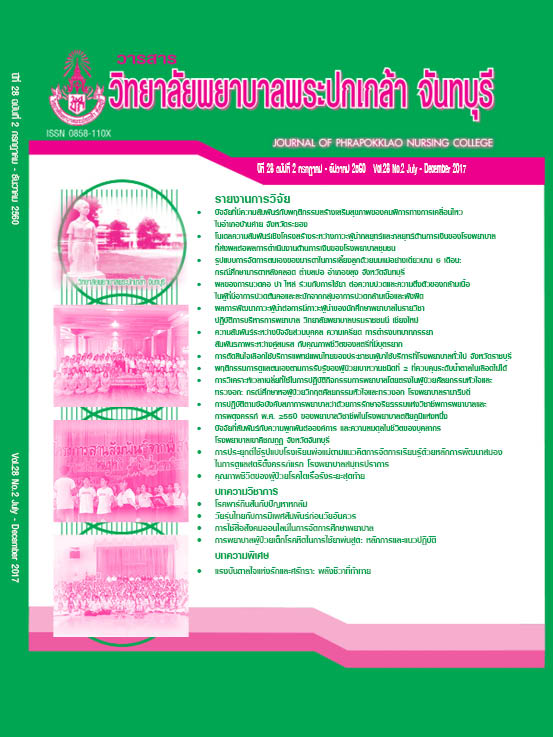The Application of The Parent School Model based on the Concept of Learning with Brain Based Learning (BBL) for Caring of Primigravidas, Samutprakarn Hospital
Keywords:
The Parent School Model, Brain based learning, PrimigravidaAbstract
This action research aimed to apply and to examine the effects of anapplication of The Parent School Model based on the concept of learning with brain based learning (BBL) for caring of primigravidas, Samutprakarn Hospital. The participants consisted of 20 primigravidas receiving services at Samutprakarn Hospital and their husbands, including 5 participants of professional nurses working at antenatal care unit, labor room, and postpartum ward, and obstetrician. The research instruments were composed of a questionnaire of personal characteristics, a questionnaire of perception of services receiving from health care personnels with the reliability of .69, a questionnaire of needs of services from health care personnels with the reliability of .93, a questionnaire of satisfaction for attending activities with the reliability of .84, a test of knowledge for performance with the reliability of .78, a questionnaire of health promoting behaviors with the reliability of .75, a recording form of birth weight, a guideline of interview, and a guideline of focus group discussion. The implementation and data collection were conducted for three phases from April to November, 2017. Statistics used for data analysis included frequency, percentage, mean, standard deviation, paired t-test, and content analysis.
The research results revealed that 1) the primigravidas had overall mean scores of perception of services receiving from health care personnels and needs of services from health care personnels at the high level ( = 3.86, SD = .32 and = 4.39, SD = .43, respectively); 2) an operation comprised three phases:- the fisrt phase were composed of an analysis of perception of services receiving from health care personnels and needs of services from health care personnels, including a caring pattern for primigravidas of the obstetrics and gynecology department, the second phase was an application of The Parent School Model, and the third phase was an evaluation of an application of The Parent School Model; 3) the primigravidas had an overall mean score of satisfaction for attending activities at the highest level ( = 4.81, SD = .39); 4) after attending activities of The Parent School Model, the primigravidas had statistically significant higher mean scores of knowledge for performance and health promoting behaviors than before the attending (t = 11.600, p < .001 and t = 6.003, p < .001, respectively); and 5) 95% of the primigravidas gave birth of 2,500 grams and over.
This research suggested that nursing administrators should apply The Parent School Model for developing the primigravida caring system emphasizing health care providers participation with continuously operation, as well as process and outcomes should be evaluated.
References
กรมอนามัย กระทรวงสาธารณสุข. (2559). คู่มือโรงเรียน พ่อ แม่ เพื่อลูกรัก “สุขภาพดี สมองดี อารมณ์ดี มีความสุข” (พิมพ์ครั้งที่ 3). กรุงเทพฯ: โรงพิมพ์นิวธรรมดาการพิมพ์ (ประเทศไทย). สืบค้น วันที่ 25 สิงหาคม 2560, จาก http://hp.surinpho.go.th/file_news/YYPZCLY.pdf
กรุณา ประมูลสินทรัพย์, กมลทิพย์ ขลังธรรมเนียม, จริยาวัตร คมพยัคฆ์, และเอกชัย โควาวิสารัช. (2556). ผลของโปรแกรมส่งเสริมสุขภาพต่อพฤติกรรมส่งเสริมสุขภาพของหญิงตั้งครรภ์วัยรุ่นครรภ์แรก. วารสารสมาคมพยาบาลฯ สาขาภาคตะวันออกเฉียงเหนือ, 31(4), 54-60.
นนธนวนัณท์ สุนทรา. (2558). พ่อแม่กับการสร้างลูกที่มีคุณภาพ. ใน เอกสารการประชุมเชิงปฏิบัติการ เรื่อง 10 ปี การเรียนรู้ตามหลักการพัฒนาสมอง. หน้า 11. วันที่ 22 สิงหาคม 2558 ณ ศูนย์การประชุมแห่งชาติสิริกิติ์. สืบค้น วันที่ 7 กันยายน 2560, จาก http://www.okmd.or.th
นภาพรรณ วิริยะอุตสาหกุล. (2556). ไอโอดีนกับสตรีตั้งครรภ์. Srinagarind Medical Journal, 28(4), 92-97.
พรนภา เจริญสันต์, ขวัญเรือน ด่วนดี, และรังสินี พูลเพิ่ม. (2555). คุณภาพชีวิตของหญิงตั้งครรภ์ที่มารับบริการฝากครรภ์ ณ โรงพยาบาลพระมงกุฎเกล้า. วารสารพยาบาลทหารบก, 13(3), 47-59. สืบค้น วันที่ 25 สิงหาคม 2560, จาก https://www.tci-thaijo.org/index.php/JRTAN/article/view/3197/4085
มาลี เกื้อนพกุล. (2554). Teenage pregnancy. ใน เอกชัย โควาวิสารัช, ปัทมา พรหมสนธิ, บุญศรี จันทร์รัชชกูล. (บ.ก.). การตั้งครรภ์ในมารดาวัยเสี่ยง. หน้า 35-49. กรุงเทพฯ: ยูเนียน ครีเอชั่น.
วาสนา ถิ่นขนอน, และวิลาวัณย์ ชมนิรัตน์. (2555). การพัฒนาแนวทางการให้บริการหญิงตั้งครรภ์วัยรุ่นโดยครอบครัวมีส่วนร่วมในคลินิกฝากครรภ์ เครือข่ายบริการสุขภาพอำเภอชัยบุรี จังหวัดสุราษฎร์ธานี. วารสารพยาบาลศาสตร์และสุขภาพ, 35(2), 25-33.
ศริณธร มังคะมณี. (2547). ผลของการใช้โปรแกรมส่งเสริมการรับรู้สมรรถนะแห่งตนในการดูแลตนเองต่อพฤติกรรมส่งเสริมสุขภาพของหญิงตั้งครรภ์วัยรุ่นครรภ์แรก (วิทยานิพนธ์ปริญญามหาบัณฑิต). กรุงเทพฯ: จุฬาลงกรณ์มหาวิทยาลัย. สืบค้น วันที่ 25 สิงหาคม 2560, จาก https://www.researchgate.net/publication/27802807_phlkhxngkarchiporkaermsngserimkarrabrusmrrthnahaengtnnikardulaetnxengtxphvtikrrmsngserimsukhphaphkhxnghyingtangkhrrphwayrunkhrrphraek
สำนักนโยบายและยุทธศาสตร์ กระทรวงสาธารณสุข. (2555). แผน 11 ของกระทรวงสาธารณสุข. นนทบุรี: ผู้แต่ง.
สุภาวดี เครือโชติกุล. (2557). กลยุทธ์การพยาบาลในการส่งเสริมการปรับบทบาทการเป็นมารดาของสตรีตั้งครรภ์วัยรุ่น. วารสารเกื้อการุณย์, 21(1), 7-16.
สุภาวดี เครือโชติกุล, และบุญศรี กิตติโชติพาณิชย์. (2551). ปัจจัยที่มีความสัมพันธ์กับความวิตกกังวลในบทบาทการเป็นมารดาของหญิงตั้งครรภ์วัยรุ่น. วารสารเกื้อการุณย์, 15(1), 107-122.
Downloads
Published
How to Cite
Issue
Section
License
Copyright (c) 2017 Journal of Phrapokklao Nursing College

This work is licensed under a Creative Commons Attribution-NonCommercial-NoDerivatives 4.0 International License.
เนื้อความ ข้อมูล และรายการอ้างอิงที่ผู้เขียนใช้ในการเขียนบทความเพื่อลงตีพิมพ์ในวารสารวิทยาลัยพยาบาลพระปกเกล้า จันทบุรี ถือเป็นความคิดเห็นและความรับผิดชอบของผู้เขียน คณะผู้จัดทำวารสารไม่จำเป็นต้องเห็นพ้องด้วยหรือร่วมรับผิดชอบ
บทความที่ได้รับการลงตีพิมพ์ในวารสารวิทยาลัยพยาบาลพระปกเกล้า จันทบุรี ถือเป็นลิขสิทธิ์ของวารสารวิทยาลัยพยาบาลพระปกเกล้า จันทบุรี หากหน่วยงานหรือบุคคลใดต้องการนำส่วนหนึ่งหรือทั้งหมดของบทความไปเผยแพร่ต่อเพื่อวัตถุประสงค์ใด ๆ จะต้องได้รับอนุญาตจากบรรณาธิการวารสารก่อน



